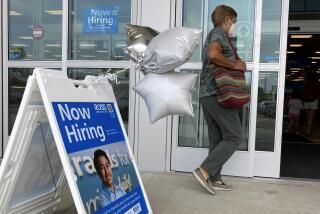U.S. Business Productivity Declines 1.2%
- Share via
WASHINGTON — U.S. business productivity fell 1.2% in the first quarter of 1985, the Labor Department reported Thursday, signaling a disturbing slowdown in economic growth and raising some concern among analysts over inflation.
However, sales of existing single-family homes in March rose to the highest level in more than four years, the National Assn. of Realtors said.
The annual sales rate of 3.05 million units recorded last month was the highest since November, 1980, when it also was 3.05 million units.
The March figure was 5.9% above the 2.88-million annual rate recorded in February and 3% higher than compiled in March, 1984.
Declining interest rates were credited with the rising sales level.
Unit Labor Costs Soar
Unit labor costs, reflecting changes in productivity and hourly compensation, spiraled upward 7.3%.
“It looks like the magic of Reagan economics is gone, certainly in those particular numbers,” said David Jones, chief economist at Aubrey G. Lanston. The recovery, which began in the last three months of 1982, has been marked generally by low inflation, strong real growth and substantial increases in productivity.
The productivity decline was the first since the third quarter of 1984, and the jump in unit labor costs was the biggest since a 7.6% rise in the second quarter of 1982.
The report is “clearly a disappointment in terms of its potential inflation impact but not surprising in view of the slowdown in the U.S. economy during the first quarter and the continuing hiring in the non-manufacturing sectors,” said analyst Allen Sinai of Shearson Lehman Bros.
Output was up 1.6% for the quarter, but hours worked were up 2.9% and hourly compensation rose 6%, the largest increase in a year. About 0.4 percentage point of the rise in hourly compensation resulted from increases in Social Security contributions, which will not continue to rise in the rest of 1985.
It is normal for productivity to moderate several years into an economic recovery, but an actual decline and the boost in hourly compensation are “two disturbing developments . . . you would not like to see,” said Edward Yardeni, chief economist at Prudential-Bache Securities.
More to Read
Inside the business of entertainment
The Wide Shot brings you news, analysis and insights on everything from streaming wars to production — and what it all means for the future.
You may occasionally receive promotional content from the Los Angeles Times.










